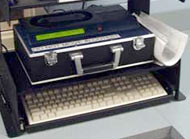Article from: www.thenewspaper.com/news/22/2280.asp
3/19/2008
New Jersey Supreme Court Reinstates DUI Breath Test
New Jersey Supreme Court ruling brushes aside concern over the accuracy of DUI breath test machines.
 The Supreme Court of New Jersey on Monday reinstated the use of breath tests in convictions for driving under the influence of alcohol (DUI). The court faced a challenge to the reliability of the Draeger Alcotest 7110 breathalyzer machine from twenty defendants who combined efforts to create a sophisticated attack on the device. A total of 10,470 DUI cases had been put on hold over the course of the three-year trial -- putting millions in fine revenue at risk. The court acted to uphold the convictions.
The Supreme Court of New Jersey on Monday reinstated the use of breath tests in convictions for driving under the influence of alcohol (DUI). The court faced a challenge to the reliability of the Draeger Alcotest 7110 breathalyzer machine from twenty defendants who combined efforts to create a sophisticated attack on the device. A total of 10,470 DUI cases had been put on hold over the course of the three-year trial -- putting millions in fine revenue at risk. The court acted to uphold the convictions.
"We conclude that the Alcotest... is generally scientifically reliable, but that certain modifications are required in order to permit its results to be admissible or to allow it to be utilized to prove a per se violation of the statute," the unanimous court wrote in brushing aside the accuracy concerns.
At issue is the fact that the Alcotest machine does not directly measure the blood alcohol content (BAC) of its subject. Instead, the device estimates BAC by performing mathematical calculations on breath readings. If the calculation is not made properly, an innocent motorist can be found automatically guilty of a serious crime.
A retired judge serving as a special master spent four months pouring over arguments for and against the device's accuracy on the high court's behalf. The Alcotest's maker reluctantly handed over the source code to a pair of independent software firms for analysis. The defense analysis criticized the shoddy programing and cited a buffer overflow error as evidence that the machine is not trustworthy. The court maintained that the error could be fixed with a revised firmware and that "stylistic" concerns about the software code were not relevant. The court also brushed aside concern that a "fuel cell drift" algorithm boosted the measurements by up to twenty-five percent to account for aging equipment.
"The algorithm alters the EC result in an amount that, we are confident, cannot fairly be seen as convicting the innocent," the court declared.
The court ordered a few minor changes to the firmware and error tolerance standards, clearing the way for pending cases to be resolved. The full text of the ruling can be found in a 265k PDF file at the source link below.
Source: New Jersey v. Chun (Supreme Court of New Jersey, 3/19/2008)
Permanent Link for this item
Return to Front Page
 The Supreme Court of New Jersey on Monday reinstated the use of breath tests in convictions for driving under the influence of alcohol (DUI). The court faced a challenge to the reliability of the Draeger Alcotest 7110 breathalyzer machine from twenty defendants who combined efforts to create a sophisticated attack on the device. A total of 10,470 DUI cases had been put on hold over the course of the three-year trial -- putting millions in fine revenue at risk. The court acted to uphold the convictions.
The Supreme Court of New Jersey on Monday reinstated the use of breath tests in convictions for driving under the influence of alcohol (DUI). The court faced a challenge to the reliability of the Draeger Alcotest 7110 breathalyzer machine from twenty defendants who combined efforts to create a sophisticated attack on the device. A total of 10,470 DUI cases had been put on hold over the course of the three-year trial -- putting millions in fine revenue at risk. The court acted to uphold the convictions.